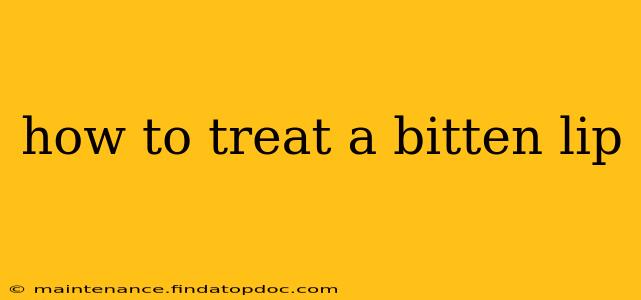A bitten lip – that annoying, painful, and sometimes even bloody mishap – is a common experience. Whether it's a minor nibble or a more significant bite, knowing how to treat it properly can significantly reduce discomfort and prevent infection. This comprehensive guide will walk you through everything you need to know, from immediate first aid to long-term healing.
What to Do Immediately After Biting Your Lip
The first few minutes after biting your lip are crucial for minimizing damage and pain. Your immediate actions will determine how quickly and effectively your lip heals.
- Assess the Damage: Gently examine your lip. Is it a small, superficial bite, or is there significant bleeding or a deep wound? A minor bite may only require simple first aid, while a severe one might necessitate medical attention.
- Apply Pressure: If there's bleeding, apply gentle pressure to the area using a clean cloth or gauze. Direct pressure helps to clot the blood and stop the bleeding. Hold the pressure for at least 10 minutes.
- Rinse Your Mouth: Rinse your mouth with clean water to remove any debris or bacteria. Avoid using mouthwash, as it can irritate the wound.
- Ice Pack: Applying a cold compress (ice wrapped in a thin cloth) can reduce swelling and pain. Apply the ice pack for 10-15 minutes at a time, several times a day.
How to Care for a Bitten Lip to Promote Healing
Once the immediate bleeding has stopped, focus on promoting healing and preventing infection. This involves diligent care and attention to detail.
- Keep it Clean: Regularly rinse your mouth with clean water throughout the day. Gentle cleansing helps to remove any food particles or bacteria that might hinder healing.
- Avoid Touching: Resist the urge to constantly touch or pick at your lip. This can introduce bacteria and delay healing.
- Hydration: Drink plenty of water to stay hydrated. This aids in overall healing and helps to keep your lips moist. Dehydrated lips are more prone to cracking and further irritation.
- Lip Balm: Apply a lip balm containing petroleum jelly or beeswax several times a day. This will help to keep the lip moisturized and protect it from further damage. Look for balms without added fragrances or flavors, as these can irritate the wound.
- Pain Relief: Over-the-counter pain relievers, such as ibuprofen or acetaminophen, can help manage pain and swelling. Follow the recommended dosage on the packaging.
When to See a Doctor
While most bitten lips heal on their own, there are situations where medical attention is necessary. Seek professional medical help if:
- The bleeding is severe or doesn't stop after 10-15 minutes of direct pressure.
- The bite is deep or involves a significant portion of your lip.
- There are signs of infection, such as increased pain, swelling, redness, pus, or fever.
- You have difficulty opening or closing your mouth.
- You experience numbness or tingling in your lip.
How Long Does it Take for a Bitten Lip to Heal?
The healing time for a bitten lip varies depending on the severity of the bite. Minor bites typically heal within a few days to a week. More significant bites may take longer – up to several weeks – to fully heal. Patience and consistent care are key to a speedy recovery.
What Can I Do to Prevent Biting My Lip?
Preventing bitten lips involves mindful habits and self-awareness. Consider these tips:
- Be Mindful: Pay attention to your chewing habits. Avoid rushing your meals and chew slowly and deliberately.
- Address Underlying Issues: If you frequently bite your lip unconsciously, consider if stress or anxiety might be contributing factors. Explore stress-reducing techniques or consult a healthcare professional.
- Avoid Hard Foods: Temporarily avoid extremely hard foods that might increase the risk of biting your lip.
How can I treat a swollen bitten lip?
Swelling is a common reaction to a bitten lip. The strategies outlined above, particularly applying an ice pack and taking over-the-counter pain relievers, are effective in reducing swelling. If the swelling is severe or doesn't improve after a few days, consult a doctor.
Can a bitten lip leave a scar?
Minor bites usually don't leave scars. However, deeper bites, especially those that involve significant tissue damage, might result in a scar. The likelihood and appearance of scarring depend on several factors, including the depth of the wound and individual healing responses.
By following these steps and paying attention to your lip's healing progress, you can effectively treat a bitten lip and ensure a speedy recovery. Remember, prevention is always better than cure, so be mindful of your chewing habits and take proactive steps to avoid biting your lip in the future.
